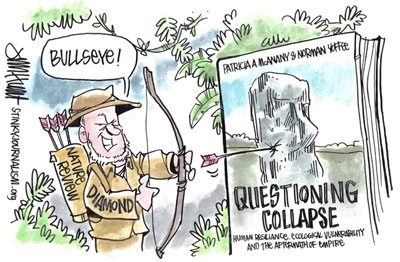This week in Nature, Jared Diamond published a review of Questioning Collapse a volume of chapters published by various authors regarding the problems in Diamond's own "Collapse" book. With my colleague, Terry Hunt, I have a chapter in the book that details the numerous empirical problems with Diamond's account of Easter Island. Diamond's review is rather sour of the book as it refutes has major thesis -- that some societies collapse and others don't.
Overall, the book is a mixed bag. In our chapter, we chose to focus the details of the events that comprise the archaeology of Rapa Nui. We can plainly show that there simply is no evidence of a pre-European major population loss. (n.b. Our comprehensive and compelling account is part of a book that is in the hands of editors right now). Other chapters tended to address some particular details that Diamond got wrong or making claims that societies change not collapse. The latter part is on the money but most of the chapters approach the issue in an empirical way rather than addressing the concepts embedded in the statement "Why do some societies collapse?" In this regard, some of the chapters end up sounding a bit like weepy leftist academic slogans. Some of the comments in Amazon reviews hit on this point.
Ultimately, however, the problem with Collapse is that by using common sense terms such as "society" and "collapse" you automatically fall into having to defend whether or not there was a "collapse" in which ever "society" you study. Societies are taken as real empirical things. Collapse is assumed to be something that happens to them. But what is a society? Can you point to one? Can you draw a line around it? What is collapse? Point to a "collapse" Do you just "know it when you see it?" If you start with those assumptions you are playing Diamond's game -- and have already bought into the set of cryptic terms he asserts. But it doesn't have to be that way. Darwinian evolution showed that by not assuming species as a real thing we can explain why the appear and change. Historical ecology shows that ecosystems are historical accidents and that by not assuming them as real we can see that they change continuously The power of the same approach is possible for an understanding of "societies" -- but we cannot start by assuming the units we are trying to explain in the first place. It is this fundamental anti-evolutionary, anti-science approach taken by Diamond that is appalling and ultimately going to be his undoing. His willful ignorance, disinterest in getting the details correct and lack of anthropological training -- combined with his swollen headed academic accolades makes him an incredibly sloppy and essentialist researcher. Sadly, people take his "expertise" as a given when in fact he is spinning a yard just as commonsensical as Abraham Simpson-- maybe less so. .
However, the MAJOR problem with his review is that it makes no mention that the book he is reviewing is a critique of HIS book, Collapse. Of course he hates it! It largely serves to undermine his particular platform by pointing out the numerous problems in his own work. The editor of Nature is largely to blame for this -- it unscrupulous and dishonest. Based on this event should we believe *ANY* of Nature's book reviews? Are they all "inside jobs" designed to maximize sales for some book either by attacking competitors or playing up a favored author? Some coverage of this lapse of honesty and the conflict of interest created by Nature has been generated via a report by Molika Ashford of StinkyJournalism.com.

Credit: Jim Hunt